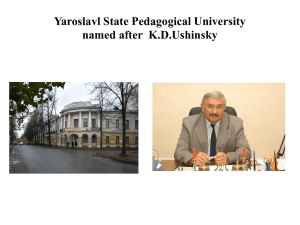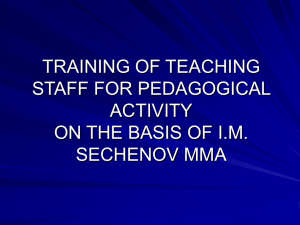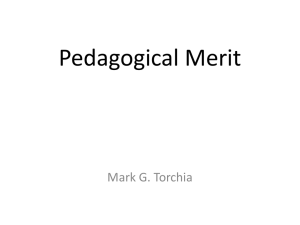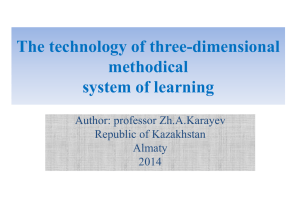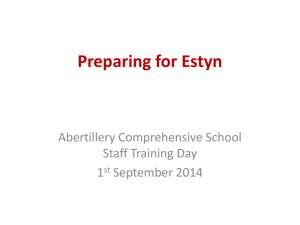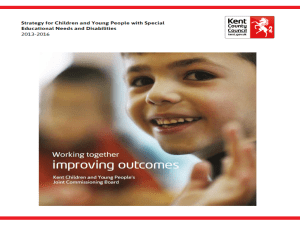special pedagogical support system in lithuania
advertisement
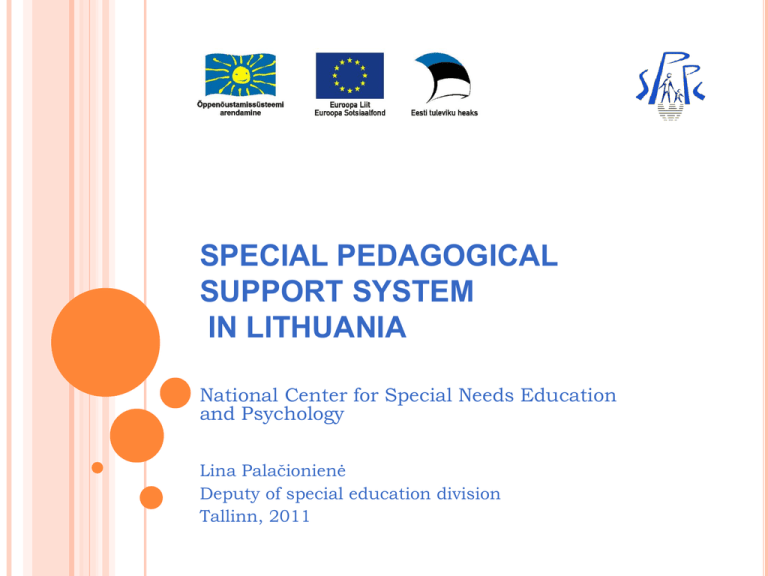
SPECIAL PEDAGOGICAL SUPPORT SYSTEM IN LITHUANIA National Center for Special Needs Education and Psychology Lina Palačionienė Deputy of special education division Tallinn, 2011 Visit from Estonia SPPC 2009 04 27-28 Reports of National centre for special needs education and psychology Reports of national examinations and qualifications center 2009 04 27-28 REPORTS /PEDAGOGICAL PSYCHOLOGICAL SERVICE OF UTENA AND ESTONIAN CONSULTING CENTER DEVELOPMENT OF SPECIAL PEDAGOGICAL AND PSYCHOLOGICAL SUPPORT SYSTEM Implementation of the PedagogicalPsychological Aid Model 2003-2005 and the Programm for Founding PedagogicalPsychological Services at Municipalities in 2004. Efforts are made to provide the special pedagogical-psychological aid in a more effective way and closer to the place of residence of children and pupils. THE MODEL OF SPECIAL PEDAGOGICAL AND PSYCHOLOGICAL SUPPORT FOR PUPILS IN LITHUANIAN EDUCATIONAL SYSTEM The 1st level specialists, who work at school give special pedagogical and psychological support - Child Welfare Commission; The 2nd level: a local Pedagogical Psychological Service at the municipal level; The 3rd level: National Center for Special Needs Education and Psychology. PROMOTING AN INCLUSIVE APPROACH IN EDUCATION POLICY The education Reform Act of June 25,1991, consolidate democratic principles of education in country-children’s with severe and profound disfunctions become “educatable”; The first basis in legislation for integrated education of children with SEN is the Act of Special educational provision for Children with Special educational Needs in Mainstream Educational Institution 1993. The Law on Special Education (now it is integrating into The Law on Education (2008-2011) NEW LEGISLATION Procedure for Assessment SEN and Assigning Special Education Procedure for the Identification SEN – groups; levels Procedure for PPC organization Procedure for Providing Special Assistance to school Procedure for Providing Special Pedagogical Assistance Procedure for School Children’s Welfare Commission organization PROCEDURE FOR THE IDENTIFICATION SEN – GROUPS; LEVELS Prepared project for evaluation, assessment and statement to identify pupils with disabilities, learning difficulties disadvantages and levels special educational needs according to A, B, C cross - national categorisation system - students with disabilities, learning difficulties and disadvantages: tripartite categorisation system CRELL (centre for research on lifelong learning) and OECD (organization for Economic Cooperation and Development). PROCEDURE FOR THE IDENTIFICATION SEN – GROUPS; LEVELS Examples of the criteria by which students with SEN include special educational needs of the group are as follows: Educational methods, curricula content adaptability; Textbooks, teaching aids selection of teaching materials, customization, training / development; Learning environment adaptability; education, technical assistance measures need; Special pedagogical assistance needs; Special assistance needs; Psychological assistance needs; Social pedagogical assistance needs. PROCEDURE FOR PROVIDING SPECIAL PEDAGOGICAL ASSISTANCE An expansion of special educational assistance. Assistance will be provided for all types of schools. Schools that do not support this providing professional assistance to ensure the municipal administration department of education and / or PPC EDUCATING PUPILS WITH SEN: ANALYSIS OF THE SITUATION Number of compulsory school aged pupils( including with SENs)- 440,504 (2009/2010) Number of compulsory school aged pupils who have SENs( in all educational settings) - 51,881 Pupils with SEN in segregated special schools – 4,253 Pupils with SEN in segregated special classes in mainstream schools - 855 Pupils with SENs in inclusive settings - 46,773 Source: Centre of information Technologies of Education NUMBER OF SPECIAL EDUCATORS NEEDS SUPPORT STAFF IN GENERAL EDUCATION SCHOOLS, 2009-2010 8 8 473 Speech therapists 988 Special pedagogues 512 Psychologists Social pedagogues 389 Surdopedagogues Typhlopedagogues Statistics Lithuania NUMBER OF SPECIAL EDUCATIONAL STAFF IN PPC, 2009-2010 21 43 NEEDS SUPPORT 80 Speech therapists Special pedagogues 150 87 Psychologists Social pedagogues Neurologists Statistics Lithuania SPECIAL PEDAGOGICAL AND PSYCHOLOGICAL SUPPORT Specialists 1 level Schools special educators, speech therapist, psychologist, social pedagogue 2 level special educators, speech therapist, psychologist,neurologist, teachers for the deaf, teachers for the blind, social pedagogue 3 level 1 or 2 levels specialists, projects managers THE FIRST LEVEL OF PEDAGOGICAL PSYCHOLOGICAL SUPPORT FOR CHILDREN WITH SPECIAL NEEDS The main goal - to provide primary pedagogical psychological assessment and special pedagogical psychological support in a nearest child’s environment; Child Welfare Commission operate in every educational establishment (in pre-school establishment, as well as in general education schools). The purpose of the Commission - to organize and coordinate the work of preventive, educational assistance, child-friendly and safe learning environment and education programs for adaptation for students with special educational needs. PROCEDURE FOR SCHOOL CHILDREN’S WELFARE COMMISSION ORGANIZATION Child welfare commission on each school The Commission consists of the headmaster School, with up to 60 pupils, the board shall consist of not less than 3 members of other schools - is no less than 5. Board members may be head of the school building or deputy head of the organizing education, education support professionals, school leaders (mentors), teachers, educators, parents (guardians), the local community, neighborhood representatives. Evaluate pupils' language development features, identify speech and language disorders Removes the pupils speech and language disorders SPEECH THERAPIST Advice to teachers, parents and other persons directly involved in the educational process. Educates the school community for pupils' special pedagogical support system Performs educational assessment of people, provides peoples knowledge, skill level accordance training programs. Help pupils master the curriculum content SPECIAL EDUCATOR Advise teachers how to apply for pupils, teaching materials and educational tools Educates the school community for pupils' special pedagogical support system PROCEDURE FOR SCHOOL CHILDREN’S WELFARE COMMISSION ORGANIZATION To gather the information about the child with learning problems and make a primary assessment of special educational needs; To discuss in a team the ways and methods of teaching the child with learning problems. To consult child’s teachers and parents (foster parents) and provide them methodological support; To appeal to the municipal PPS in cases when child has to be taught according educational programmes. PROCEDURE FOR SCHOOL CHILDREN’S WELFARE COMMISSION ORGANIZATION Gather information from teachers, class leaders (mentors), educational support professionals, parents (guardians), the child takes into account the environment and school climate factors faced by children with SEN, children from socially excluded risk groups of economic difficulty, go back to families abroad, plan, or any other educational assistance will be provided, by whom and for what you will be responsible; Examines the relationship between children, teachers and child relationship problems, and provides suggestions for teachers on the improvement of relations; The Principal shall provide proposals on social support provision. THE SECOND LEVEL OF PEDAGOGICAL PSYCHOLOGICAL SUPPORT FOR CHILDREN WITH SPECIAL NEEDS There are 60 municipalities in Lithuania; Till 2004 pedagogical psychological services existed only in 26 municipalities; There are 55 municipal pedagogical psychological services today. DEVELOPMENT OF PEDAGOGICAL PSYCHOLOGICAL SERVICES MAIN FUNCTIONS OF PPS ARE: To assess the child's learning difficulties, educational, psychological and personality and learning problems, special needs, maturity of the child's school, if necessary, appoint a special education Provide psychological, social, educational, informational educational assistance to children, special educational assistance to people with SEN under 21 years of age Provides information, expertise and counseling to parents and schools, the educational staff Provide psychological, social, pedagogical, special pedagogical assistance to schools that do not help education professionals MAIN FUNCTIONS OF PPS ARE: To implement programs and projects on the prevention of violence, bullying, drug abuse, suicides To organize training courses, seminars, lectures for teachers, school specialists, parents on child psycho - emotional development, education To construct recommendations on the educational curriculum for child’s special needs. To consult child’s teachers and parents (foster parents) and provide methodological support National centre For Special Needs Education and Psychology The main goal: To develop the special pedagogical and psychological support system in Lithuania and make this system more effective. CENTER’S TASKS: To create and implement the strategy of special pedagogical and psychological support system in Lithuania; To implement the system of provision of special education materials; To organize execution of national prevention programs, financed by the Ministry of Education and Science MAIN ACTIVITIES: Coordinates the first and second level of special pedagogical and psychological support system; Provides methodical support for pedagogical psychological services on the municipal level; Organizes training programs for specialists – psychologists, special pedagogues, speech therapists, social pedagogues; Participating in the development of legislation acts; Evaluates special educational needs of a child on difficult or problematic cases. NATIONAL CENTRE FOR SPECIAL NEEDS EDUCATION AND PSYCHOLOGY DIVISION FOR SPECIAL EDUCATION Legislation acts Consulting Methodical support, publishing PPC Cordination Projects/ ESUPA Training National centre For Special Needs Education and Psychology Division for Special Education Main responsibilities To work on the development of special pedagogical support system. Collects information about municipal pedagogical psychological service activity problems, needs of specialists. Provides supervision or advice on assessment of education needs of a child in difficult or problematic cases. Provides methodical support for the municipal pedagogical psychological services. Organize training programs for specialists of municipal pedagogical psychological services. NATIONAL CENTRE FOR SPECIAL EDUCATION AND PSYCHOLOGY NEEDS DIVISION FOR SPECIAL EDUCATION PPC methodical support /meeting day. Team of PPC specialists Team work Problematic assessment cases Individual consulting Certification for PPC specialists METHODICAL SUPPORT PREPARATION/ PUBLISHING For special educators (PPC) „ Assessment tasks of pupils academic knowledge and achievement for I-IV and V-VIII grades”. Purpose - assess abilities and difficulties of learners, identify individual achievements and educational needs. - equalize special educators achievement tests in pedagogical and psychological services. METHODICAL SUPPORT PREPARATION/ PUBLISHING For speech therapists (PPC) “Book of speech therapist” Purpose - assessment spoken and written language of preschool and school age child. - equalize speech therapist achievement tests in pedagogical and psychological services. METHODICAL SUPPORT PREPARATION/ PUBLISHING For speech therapists (PPC) “Speech therapy aid for stutters”. „ Therapy for stuttering “ Handbook for speech therapist. METHODICAL SUPPORT PREPARATION/ PUBLISHING Special educational needs student in mathematics education features Primary and basic education according to programs adaptation recommendations for special needs pupils with moderate, severe, profound intellectual disorders MTP+, 12 komponentas Methodical recommendation for specialists and parents SOME FUNCTIONS: Development of catalogue of SEM; www.sppc.lt Organizing of assesment of textbooks adaptated for SEN pupils CENTER FOR SPECIAL Thank you for your attention NEEDS EDUCATION AND PSYCHOLOGY Viršuliškių 103, Vilnius Lithuania Tel. 2426403, Fax. 2427002 E-mail: info@sppc.lt www.sppc.lt
